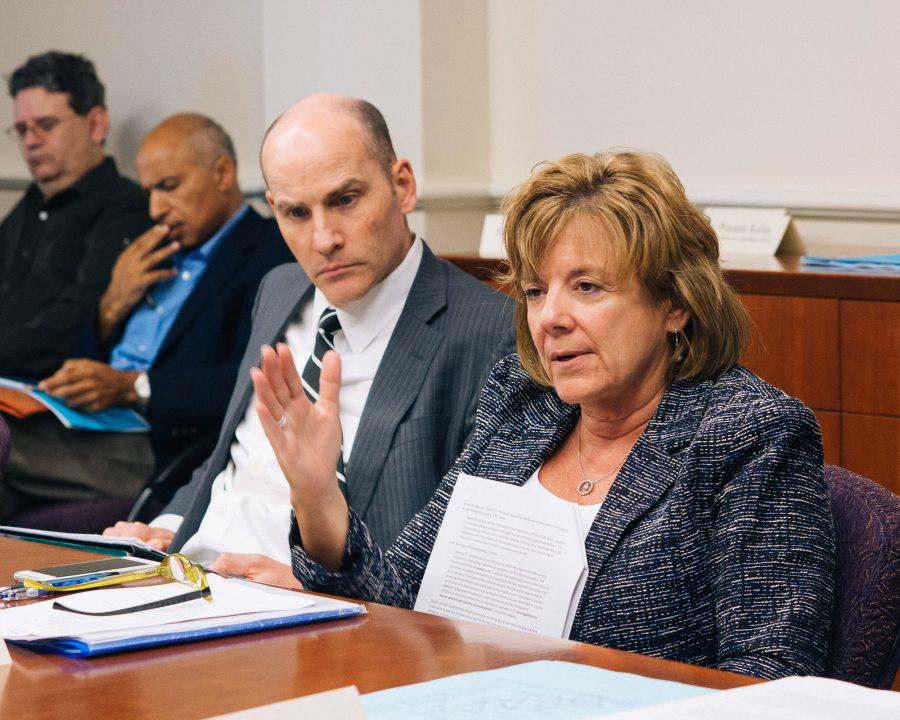College of Medicine curriculum approved at academic senate meeting
Interim Chancellor Barbara Wilson speaks during the SEC meeting in Urbana on April 25.
Sep 20, 2016
The Carle Illinois College of Medicine is one step closer to recruiting its first class, as the Academic Senate unanimously approved the college’s four-year medical degree curriculum plan for the engineering-based medical school.
The curriculum has been in the works since December 2015 and is due to the Liaison Committee for Medical Education, a national board that oversees medical schools, by Dec. 1. The University cannot begin to recruit students until it receives preliminary accreditation.
Before senators approved the curriculum, they had questions and concerns about whether the new college would take resources and money from other areas of campus. Because the college plans to be interdisciplinary and include curriculum and collaboration from all colleges across campus, senators asked how it would impact them.
Senate Executive Committee Chair Gay Miller said the state budget remains a continuous area for concern for the University with the impasse. Interim Provost Ed Feser said the campus is down 40 tenured faculty members, with approximately 1,930 members.
The college is funded through tuition and fees, a $100 million contribution from Carle Foundation, philanthropy and other corporate contributions. It will not receive any general revenue funding from the State of Illinois, according to the college’s business plan.
Get The Daily Illini in your inbox!
Mark Steinberg, academic senator from the department of history, said the college should remain ambitious despite being in the midst of a financial crisis.
“There is concern that during a time when the campus has lost a huge number of faculty, especially in humanities and social sciences, where there are serious concerns that we need to prioritize and rebuild our reputation across the board as a University,” Steinberg said.
Sternberg questioned if there would be a transference of resources over time, such as not hiring someone in LAS because they need to hire physicians for the College of Medicine.
Feser said it will be possible to trace how those resources change, but at this point the University doesn’t have any plans to reallocate funds from one college to another or ask the state for more general revenue funds.
The college plans to work the closest with the College of LAS and Engineering to engage the faculty for teaching and research.
“We are not looking to build a college where the faculty are exclusively within the College of Medicine,” Feser said. “If we were to hire someone for medical ethics, we might do it from another college. One of the benefits from this approach is that we are going to have the college embedded across the campus, which is unusual.”
Chantal Nadeau, faculty senator from the department of gender and women’s studies, asked why the College of LAS was singled out and what kinds of collaborations would be called for.
Rashid Bashir, head of the department of bioengineering and co-chair of the college’s curriculum committee, said the college will not be siloed because the basic sciences teaching comes from LAS, MCB, Veterinary Medicine, IB and more. Students will have to create a capstone project and will be put in teams and have to work with various members from colleges, he said.
Bashir said the college’s first dean Dr. King Li, who starts Oct. 1, will work with the colleges to see how collaborations will work. He said humanities will also have a role in the college with educational psychology and sciences.
“I believe more faculty from the colleges will be invited to come teach as we move forward,” Bashir said.
Susan Martinis, professor in biochemistry, said LAS was selected so the College of Medicine could build off the infrastructure the college already has. She said LAS has been supporting the University system’s regional medical college for the last 20 years.
Bashir said the curriculum is case-driven and will be team-based with problem-solving instead of a typical lecture.
The initial class of 2018 will start with 32 students and will continuously increase to 64 students admitted in 2022, totaling 176 students. Faculty will also be hired in small rates with eight faculty in 2018 to 28 faculty in 2022.
Currently, most medical schools have two years of basic science education and two years of clinical sciences, but the Carle Illinois college will instead teach basic sciences in 1.5 years, starting clinical training in the second year and begin engineering, innovation and clinical rotations in the third and fourth years.
“Our model is very unique,” Bashir said. “We have the basic sciences upfront, but we compress them and teach students how to learn instead of just material.”
Classrooms and teaching will be held in Everitt Laboratory, which will also house the college’s $10 million JUMP Simulation Center, funded by financial firm Jump Trading. The Medical Sciences Building will undergo renovation and will eventually house the dean’s office.
Students will do clinical rotations at the Carle Foundation Hospital and clinics.
The curriculum will also be reviewed by the Illinois Board of Higher Education and the Board of Trustees.
“We are trying to build something unique,” Bashir said. “We are not trying to be the same as everyone else.”
@MeganAsh_Jones
Correction: The paragraph starting with “Steinberg questioned if…” used to have a wrongly paraphrased quote by Mark Steinberg. The Daily Illini regrets this error.






